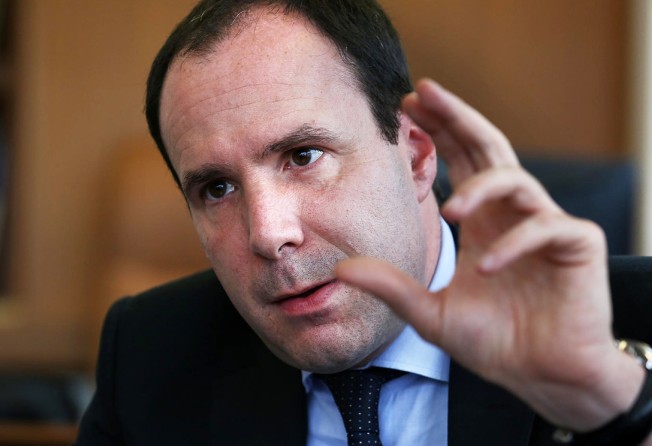
France out to build on gains as yuan hub, consul general in Hong Kong says
The fifth-largest offshore yuan centre is keen to grab a bigger slice of the pie, the consul general says, as trade linkages with China expand

France wants to expand its yuan business on the back of a strong trade relationship with China, while its financial firms are keen to offer yuan investment products, French consul general Arnaud Barthelemy said.

"The French government is very supportive in developing the yuan business because we have a large number of companies that have trade relationships with China and Hong Kong. These firms want to use the yuan to settle trade," Barthelemy told the South China Morning Post.
"In addition, Paris is a leading international financial centre and we have many big banks and asset management companies which would like to offer yuan bonds, yuan funds or other yuan investment and derivative products for investors to trade."
Outside the mainland, Hong Kong and Taiwan, French firms lead in the use of yuan, according to a HSBC report on 1,034 companies in 11 markets. Some 26 per cent of French companies settle their trades in yuan, followed by 23 per cent for Germany, 17 per cent in the US, 15 per cent for Singapore and 14 per cent in Britain.
"France has a good political relationship and huge trade transactions with mainland China. There are also many Chinese companies investing in France and vice versa. It is natural for France to develop as a key yuan hub in Europe," Barthelemy said.
Bank of China issued a yuan bond in Paris earlier this month, he said, while seven large French firms have issued yuan-denominated dim sum bonds in Hong Kong.
Last year French companies exported €14.7 billion (HK$153 billion) of goods to the mainland, including planes, cars, electronics, industrial goods, fashion, cosmetics, food and wine. Exports to Hong Kong stood at €4.8 billion last year. However, trade in luxury goods and fine wine has slowed due to Beijing's anti-corruption campaign.
Barthelemy said French companies were not worried about the slowdown.
"It is, in fact, a more healthy development for the long term to see the wine price go down to a more reasonable level. There is the growing middle class on the mainland that likes to consume French food, wine, fashion and lifestyle products. This is why we are very positive about the future growth of trade and the yuan business," he said.
Raphaelle Eloy, trade commissioner with the French consulate-general, said car exports from France to the mainland in 2013 had grown 13.6 per cent year on year, while fashion, shoes and accessory exports were up by 15 per cent.
We are very positive about the ... growth of trade and the yuan business
"The growing middle class in China would be the driving force to drive French business with the mainland," she said.
Barthelemy said the challenge would be how to help small and medium-sized French enterprises to export their goods to the mainland and Hong Kong. "Many good food and wine companies and innovative companies are small firms and their products would be popular with Chinese consumers, so we would like to help bring them here," he said.
The French population in Hong Kong has grown to more than 17,000, double what it was in 2006, due largely to the influx of French firms to take advantage of mainland business opportunities. Barthelemy said that although the mainland had not yet made its currency fully convertible, firms in France have not worried about the restrictions.
"We have seen China has relaxed usage of the yuan in the past few years. It is going in the direction of making it more flexible and open for the international world to use the currency," he said.
The next chapter for yuan business development in France would be to go beyond trade finance and use the currency for investment. France is the first euro-zone country to receive a quota under the renminbi qualified foreign institutional investor scheme, having been allocated 80 billion yuan (HK$100.5 billion) in March, to enable investments in the Shanghai and Shenzhen stock and bond markets. Germany received the same quota last week while Britain and Singapore were given their quotas last year, and Hong Kong in 2011.
"I do not think France is competing with Hong Kong or other international financial centres. We only need to make the pie of the yuan business bigger. The more international markets that are using the yuan, the more liquidity the currency has outside China," Barthelemy said.